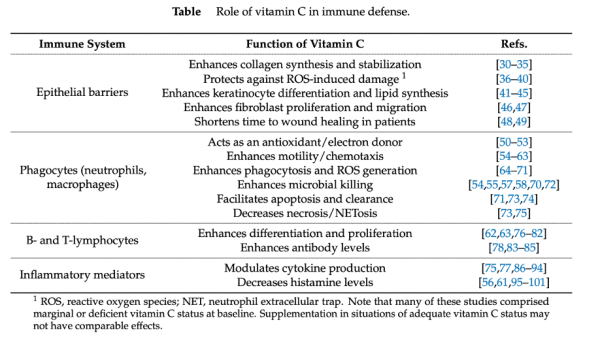Vitamin C is an essential human micronutrient that, in addition to being a potent antioxidant protecting the body from endogenous and exogenous oxidative challenges, is also a cofactor for a range of biosynthetic and gene regulatory enzymes and likely plays a key role in its immune-modulating effects (Vitamin C in human health and immune function).
More than half a century of research has shown that vitamin C plays a key role in various aspects of the immune system (as shown in the table below), particularly in the function of immune cells. Vitamin C supports epithelial barrier function against pathogens and promotes the oxidant scavenging activity of the skin, thereby potentially protecting against environmental oxidative stress. Vitamin C stimulates neutrophil migration to the site of infection, enhancing phagocytosis and oxidant production, as well as microbial killing.
At the same time, it protects host tissues from excessive damage by enhancing neutrophil apoptosis and macrophage clearance and decreasing neutrophil necrosis and NETosis. The role of vitamin C in lymphocytes is less clear, but it has been shown to enhance the differentiation and proliferation of B- and T-cells, probably due to its gene-regulating effects.
Vitamin C deficiency results in impaired immunity and a higher susceptibility to infections. In turn, infections significantly impact vitamin C levels due to enhanced inflammation and metabolic demands. In addition, vitamin C supplementation appears to prevent and treat respiratory and systemic infections by enhancing the function of various immune cells.

Epidemiological studies have shown that vitamin C deficiency remains relatively common in Western populations. Reasons for this include reduced intake coupled with limited body stores; Increased needs occur due to pollution and smoking, fighting infections, and diseases with oxidative and inflammatory components, e.g., type 2 diabetes, etc. Ensuring adequate intake of vitamin C through the diet or via supplementation, especially in groups such as the elderly or in individuals exposed to risk factors for vitamin C insufficiency, is required for proper immune function and resistance to infections.
Nowak, D. (2021). Vitamin C in human health and disease. Nutrients, 13(5), 1595.
Carr, A. C., & Maggini, S. (2017). Vitamin C and immune function. Nutrients, 9(11), 1211. Vitamin C in human health and immune function. [Link]
